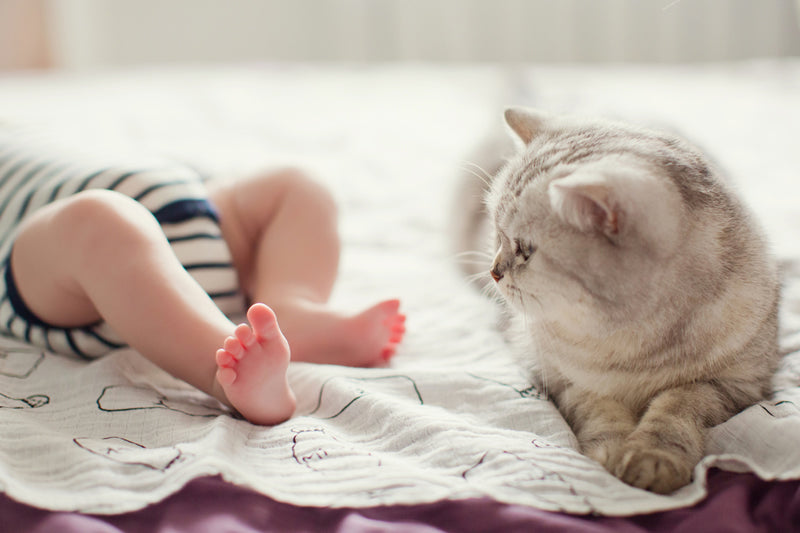
Top 5 Ways to Prepare Your Cat for a New Baby
When you're having a baby, it's perfectly normal to be hypervigilant about safety. You want to protect your baby from danger, and you'll do whatever it takes to keep your little bundle of joy safe. As you cover electrical sockets and attach dressers to walls, are there other kinds of dangers you need to be aware of?

What about your pet cat? Is it safe to have a cat around a newborn? Could your cat suffocate your baby? How cautious do you need to be? Well, we have good news. Babies can be safe and happy with your cat around as long as you take some simple precautions, like not leaving your cat alone with a sleeping baby. A cat can be a real blessing and joy to your little one. Just follow these five tips to prepare your cat for a new baby, and you'll have a safe and tranquil home to welcome the newest addition to your family.
1. Give Your Sleeping Baby Space Away from Your Cat
There's an old wives' tale that cats can "steal" or "suck away" a baby's breath, but this isn't true.1 Cats don't target babies, and they don't maliciously try to smother them.2
But that doesn't mean you shouldn't be cautious with your baby. You'll want to make sure your cat doesn't sleep in your baby's crib. Cats seek warmth and could possibly sleep too close to your baby, making breathing more difficult.
Consider closing the nursery door when you're not around or set up a gate or screen door to keep kitty out. Some parents even invest in bassinets with canopies that help guarantee your cat can't get inside.
2. Let Your Cat Explore the Nursery Before Your Baby Comes Home
To ensure the smoothest transition possible and the most peaceful home for your baby, introduce your cat to big changes in your household before your baby arrives. Get that nursery set up early so your cat can get used to the new furniture long before your baby is born.3
If you're worried that your baby might get hurt if your cat jumps on the nursery furniture, then take this opportunity to train your cat out of the habit. This might involve clicker training or putting unwelcoming textures (like double-sided tape) on surfaces you don't want your cat sitting on. Some cats even respond to a well-timed "hiss" from you when they do something you don't like.
Of course, you'll still need to monitor your kitty when he's around your baby. Training can help cut down on unwelcome jumping attempts, but there's no substitute for a parent's loving attention.
3. Give Your Baby a Peaceful Homecoming
You can give your baby a peaceful homecoming by introducing your cat to baby smells and sounds a few weeks before your baby comes home.4 This can help ensure your cat doesn't get scared or meow a lot when your baby arrives, possibly disrupting your newborn.
Play recordings of baby noises at different times of the day and night, slowly increasing the volume over time. If you're going to use baby mobiles or toys that make sound, play those from time to time too.
If there's a specific baby lotion you'll be using a lot, start using it now. You might also want to get a receiving blanket from the hospital ahead of time, so your cat can adjust to the hospital's scent.
Play with your cat and give her treats while you're wearing the baby lotion or playing baby sounds. This can help your kitty make positive associations with the new sounds and smells.
4. Change Your Schedule Early
You don't want your cat to meow or disrupt your baby during late-night feedings, making your infant upset. Minimize negative associations your cat might make with your baby by changing your schedule now rather than when your baby arrives. If playtime, feeding time, and even sleeping locations are going to change for kitty, make the switch now. If a different parent is going to feed and brush your cat once the baby comes, change things up a few weeks early.
You might also want to set up a calming diffuser. Diffusers can mimic pheromones that communicate to your cat that everything's safe and okay.
5. Monitor Your Baby Closely
Monitor your cat and your baby closely. Some cats are friendly to everyone, while other cats need space so they don't get stressed and scratch. Don't let your guard down or leave your cat alone with your baby. You also don't want to let your baby play with your cat too soon, or you'll risk your baby getting scratched. Introduce them slowly and let mutual trust build over time.
Another way to keep your baby safe is by making sure your cat still feels loved, even after your baby arrives. Keep up with playtime, treats, and snuggles so your kitty feels secure. You might even give your cat new activities to help her stay entertained. Consider a cat scratcher, an interactive toy, or even a new window perch so she can safely watch what's going on outside while you're caring for your infant.
Your baby really can be perfectly safe with your cat. Just take these simple precautions to get your cat ready for your infant's homecoming. With the right preparation, your fur baby is absolutely going to love your human baby, and vice versa.
- Castro, Joseph. "Do Cats Really Kill Babies By Sucking Away Their Breath?" LiveScience.com, 22 August 2012, https://www.livescience.com/22449-do-cats-really-kill-babies-by-sucking-away-their-breath.html.
- Spanner, Andrew. "Do Cats Ever Really Smother Babies?" WalkervilleVet.com, 17 February 2019, https://www.walkervillevet.com.au/blog/cats-smothering-babies/.
- ASPCA. "Cats and Babies." ACPA.org, https://www.aspca.org/pet-care/cat-care/cats-and-babies.
- Schultz, Jacque Lynn. "Prepare Your Cat for Your New Baby." Pets.WebMD.com, https://pets.webmd.com/cats/guide/new-baby-cat-safety#1.
